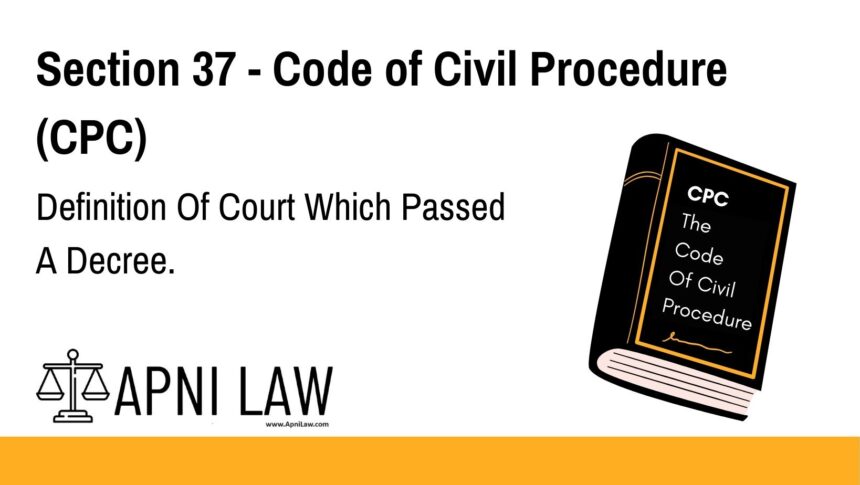Code
CPC (1)The expression “Court which passed a decree,” or
words to that effect, shall, in relation to the execution of decrees, unless there is anything repugnant in the
subject or context, be deemed to include,(a) where the decree to be executed has been passed in the exercise of appellate jurisdiction, the
Court of first instance, and(b) where the Court of first instance has ceased to exist or to have jurisdiction to execute it, the
Court which, if the suit wherein the decree was passed was instituted at the time of making the
application for the execution of the decree, would have jurisdiction to try such suit.1[Explanation.– The Court of first instance does not cease to have jurisdiction to execute a decree
merely on the ground that after the institution of the suit wherein the decree was passed or after the passing
of the decree, any area has been transferred from the jurisdiction of that Court to the jurisdiction of any other
Court; but, in every such case, such other Court shall also have jurisdiction to execute the decree, if at the
time of making the application for execution of the decree it would have jurisdiction to try the said suit.]
Perfect 👍 This provision is Section 37 CPC – Court by which Decree may be Executed. Let’s create the SEO-optimized article in the ApniLaw format with explanation, examples, FAQs, and internal links.
Section 37 CPC: Court by which Decree may be Executed
Code
Section 37 – Code of Civil Procedure
(1) The expression “Court which passed a decree,” or words to that effect, shall, in relation to the execution of decrees, unless there is anything repugnant in the subject or context, be deemed to include—
(a) where the decree to be executed has been passed in the exercise of appellate jurisdiction, the Court of first instance; and
(b) where the Court of first instance has ceased to exist or to have jurisdiction to execute it, the Court which, if the suit wherein the decree was passed was instituted at the time of making the application for the execution of the decree, would have jurisdiction to try such suit.
Explanation – The Court of first instance does not cease to have jurisdiction to execute a decree merely on the ground that after the institution of the suit wherein the decree was passed or after the passing of the decree, any area has been transferred from the jurisdiction of that Court to the jurisdiction of any other Court; but, in every such case, such other Court shall also have jurisdiction to execute the decree, if at the time of making the application for execution of the decree it would have jurisdiction to try the said suit.
📖 Source: Section 37 CPC – Court by which Decree may be Executed (ApniLaw)
Explanation
Section 37 CPC clarifies what is meant by the term “Court which passed a decree” in relation to execution proceedings.
Key points:
- Appellate Decrees – If a decree is passed by an appellate court, execution lies in the Court of first instance.
- Court Ceasing to Exist/Jurisdiction Lost – If the trial Court ceases to exist or loses jurisdiction, the Court which would have jurisdiction to try the suit at the time of execution application will be the executing Court.
- Explanation Clause – A Court does not lose execution jurisdiction merely because territorial jurisdiction is changed later. In such a case, both the original Court and the new Court can execute the decree.
Thus, Section 37 ensures that execution proceedings do not fail due to territorial or jurisdictional changes after decree.
Illustrations
- Example 1: Appellate Court Decree
A trial Court dismisses a suit, but the appellate Court reverses and passes a money decree. Execution will lie in the trial Court (Court of first instance) under Section 37(a). - Example 2: Court Ceasing to Exist
A suit is decided by a Civil Court that is later abolished. The new Court with jurisdiction at the time of execution becomes the executing Court under Section 37(b). - Example 3: Change of Territorial Jurisdiction
A decree is passed by Court X. Later, the area is transferred to Court Y. Both Court X and Court Y will have jurisdiction to execute the decree.
Common Questions and Answers
1. Which Court executes a decree passed by an appellate Court?
The Court of first instance, unless otherwise directed.
2. What if the Court of first instance ceases to exist?
The Court which would have jurisdiction to try the suit at the time of execution application becomes the executing Court.
3. Does transfer of jurisdiction take away execution power?
No. The original Court still has power, and the transferee Court also gains jurisdiction (as per the Explanation).
4. Can both Courts execute the decree simultaneously?
Yes, both may have jurisdiction, but execution will usually proceed in the Court where the application is filed first.
5. Why was Section 37 necessary?
To remove confusion about the expression “Court which passed a decree”, particularly in cases of appellate decrees, abolished Courts, and territorial changes.
Conclusion
Section 37 CPC ensures that execution of decrees is not obstructed due to appellate decrees, abolition of Courts, or changes in territorial jurisdiction. It broadens the meaning of “Court which passed the decree” to include the trial Court, successor Courts, and even newly assigned Courts, thereby safeguarding enforceability of decrees.
👉 For more details, visit: Section 37 CPC – Court by which Decree may be Executed (ApniLaw).








